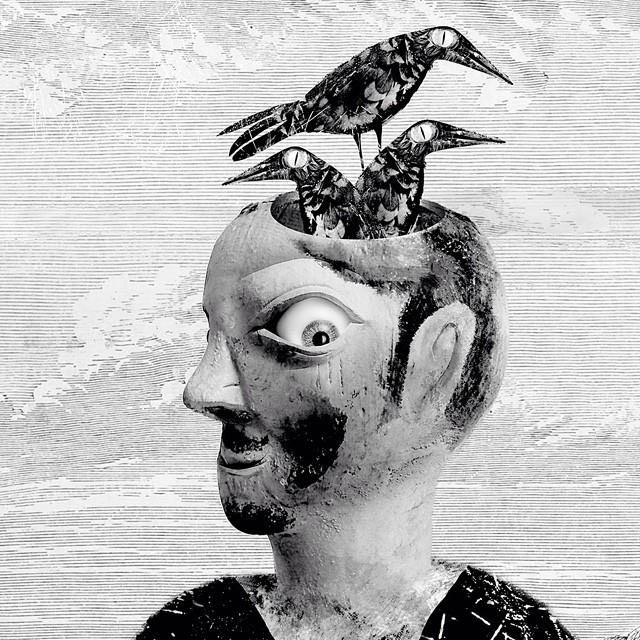To the birds
To the birds
An awakening sorrow
To the birds
To the birds
My soul shall borrow
Until little remains
Save their troubadour song
To the birds
To the birds
Or
To me
All along.
“It’s a fabricated kind of love,” said Lucie Mayweather to no one. She lit a cigarette and tapped her fingers along the old statue behind her. It too seemed weary of her presence, so she leaned with whatever tenderness she could muster against its cool, marble frame. In the heavy nightfall, she was but strands of unwashed auburn hair alight with pale smoke and madness.
“Whose love?”
A smarter woman than Lucie Mayweather might’ve questioned the voice, or better yet recognized it. But Lucie was forever the foolish one, the one abandoned by reason and rhyme.
“Mine,” she replied. “Mine is a fabricated kind of love.” Even to her four-decades-old ears, the words sounded like meager pieces of noise, thin and untrue. Behind her was the finely cut truth, a chiseled rendering of an I-don’t-give-a-damn renegade cowboy long ago loved.
Now, her once flesh-and-blood husband was nothing but stone.
When Lucie woke hours later to a milky morning light, a crust beneath her eyes and a low warble of birds, the excuse that tumbled from her weary head was the only one she could find: “I fell asleep.”
The officer was tall and brown eyed and kinder than most. He sent her toward the brightening day with a “get your act together, Lucie,” and a “I don’t enjoy finding my sister asleep on the street, so promise me this is the last time.”
“I promise,” Lucie mumbled.
There was no mention whatsoever in the exchange between devoted brother and deviant sister of how the birds always perched on the statue had suddenly ceased their effervescent chirping, or how the marble depiction of Mayor Buck Mayweather that stood for twelve years in the center of town had, without warning, disappeared.
The day was young and filled with every happenstance of spring as Lucie took her regular morning walk to the train station on Flint Street. Watching the steel-wheeled trains come and go and come then go again with such punctual confidence gave her a heady sense of order and the distinct ability to breathe. Usually, a flutter of birds pecked at crumbs near her bare feet but today the crumbs remained unpecked; there wasn’t a bird in sight.
“Good morning, Lucie.”
Chip Perriwinkler, an unmemorable and stout type of man, collected tickets from passengers as they boarded the trains and would most days bid Lucie a friendly, if not pitiable, hello. This time his greeting seemed overwrought with the exasperated air of someone who had something to say.
“Have you heard the news?”
Lucie shook her head. She hadn’t heard the news. There was still a sizable group of people in town unwilling to talk to her. It was always the same question asked of any one of them who dared look her way. “Didn’t they tell you Lucie Mayweather went insane?”
No, she wasn’t insane. Lucie was just insanely alone.
“Your husband is gone.”
Just those two words, just those two very words your husband and she was also gone. For a second time in the life of Lucie Mayweather, her blood turned to ice and unmoving stone, her heart fidgeted uneasily in her ribcage, desperate to escape and find refuge in a body much safer than hers.
“What did you say, Chip? How can he … gone … again?”
“Yes, but not that Buck. The real one’s still dead, unfortunately. I mean the statue by Silver Avenue they say you like to sleep with, poor thing. It’s been missing since this morning.”
Lucie fumbled with a half-whispered goodbye and then told Chip, “I must be off! I’ll find him again!”
What hours were left of that morning and then afternoon, Lucie used to search every corner of town. In doing so, she unknowingly turned her day into a series of encounters with familiar characters from her life, Act 1: The Mayor’s Wife. Henry the postman, Henrietta his wife, Cybil the grocery store clerk … any one of them could’ve seen Buck and might help bring him back. No such luck, though, and instead, Lucie was served a barrage of self-interested sympathy:
Henrietta: “My goodness, Lucie! What a surprise to see you here at the post office. You look … Well, you’re here so that’s marvelous!”
Cybil: “Don’t worry, those few pounds will come right off with some regular exercise. It might help to wear some shoes if you’re planning on a run.”
Henry: “Oh. Lucie. Thought you was dead. Pleasant surprise and all that jazz.”
Even her brother the officer could offer no help. “It’s probably an act of casual vandalism,” he told her. No one had filed a complaint; in fact, there was already talk of commissioning a new statue of Mayor Corky Nambler to stand in the center of town. “People care more about where all the birds have flown,” he said. “If you figure that mystery out, you let me know.”
Night came thick as a statue-stealing thief and Lucie was again alone on Silver Avenue, sitting in the empty spot of sidewalk where Buck’s sinewy stone figure had been. She sparked her last cigarette but didn’t smoke it. Instead, she put a finger to its amber tip, glowing a brilliant tangerine, and thought for a moment about how nice it might feel to burn the palm of her hand … how nice it might feel …
“Don’t do it, Lucie.”
It’s Buck, said her heart to the stone figure standing before her. The top of its marble head had been cut, or maybe eaten and every bird from town, every swallow and every robin appeared to be pecking at a piece of the statue’s face. His eyes were wide and wild but alive, so deliciously alive. “Where have you been?” Lucie asked, even if she really wanted to say, “Where will we go?”
And Buck laughed, a squawky, strange guffaw that swirled into the darkness. It was a sound made not from the rebellious but steadfast cowboy she’d married but from whoever or whatever this was. “My dear, isn’t it obvious?” Buck said at last. “In complete and honest truth, I’ve gone to the birds!”
[This story was inspired by an illustration by the brilliant artist known as Faraway Joe.]



One Comment